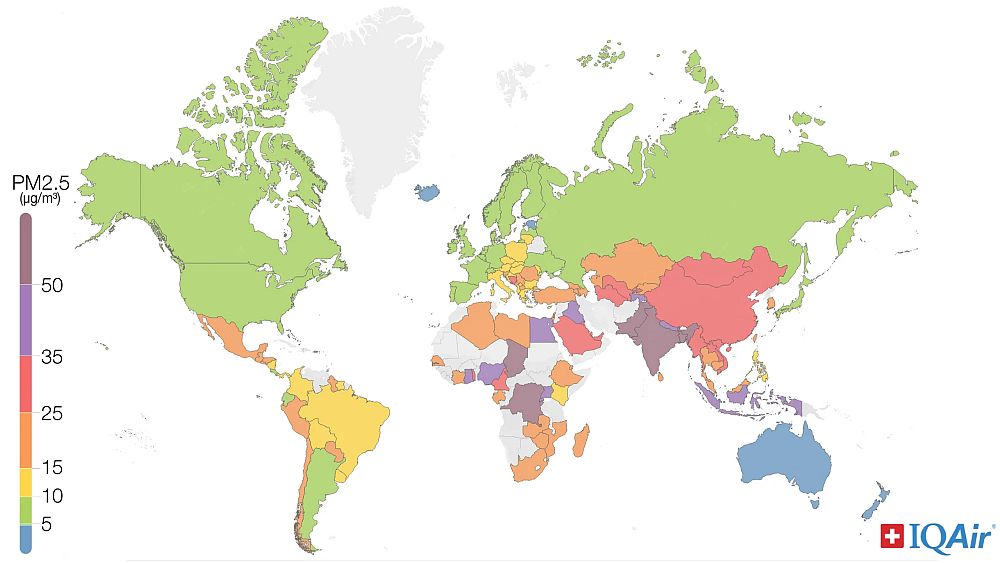Global air quality crisis: only 17% of cities meet WHO standard
A stark picture of global air quality emerges from IQAir's 7th annual World Air Quality Report, released today. Analyzing data from over 40,000 air quality monitoring stations across 8,954 locations in 138 countries, territories, and regions, the report reveals that a mere 17% of cities worldwide met the World Health Organization's (WHO) annual guideline for fine particulate matter (PM2.5) of 5 µg/m³.
The comprehensive dataset, compiled and analyzed by IQAir's air quality scientists, underscores the pervasive nature of air pollution as a critical global challenge with significant implications for public health and environmental engineering efforts.
Only seven countries managed to meet the stringent WHO annual average PM2.5 guideline in 2024: Australia, Bahamas, Barbados, Estonia, Grenada, Iceland, and New Zealand. In stark contrast, 126 out of the 138 assessed countries and regions (91.3%) exceeded this guideline.
The report identifies the five most polluted countries in 2024 based on average PM2.5 concentrations:
- Chad (91.8 µg/m³), exceeding the WHO guideline by more than 18 times.
- Bangladesh (78.0 µg/m³), more than 15 times higher than the guideline.
- Pakistan (73.7 µg/m³), more than 14 times higher.
- Democratic Republic of the Congo (58.2 µg/m³), more than 11 times higher.
- India (50.6 µg/m³), more than 10 times higher.

Regionally, Central & South Asia bore the brunt of the crisis, hosting the top seven most polluted cities globally. Byrnihat, India, registered as the most polluted metropolitan area with an alarming annual average PM2.5 concentration of 128.2 µg/m³. India alone accounted for six of the nine most polluted global cities.
In the United States, Los Angeles, California, was the most polluted major city, while Ontario, California, recorded the highest pollution levels overall. Seattle, Washington, stood out as the cleanest major U.S. city. On a global scale, Mayaguez, Puerto Rico, was the cleanest metropolitan area with an average PM2.5 concentration of 1.1 µg/m³.
The report also highlights critical data gaps, particularly in Africa, where the scarcity of real-time, publicly accessible air quality monitoring data is severe, with only one monitoring station available for every 3.7 million people. This lack of infrastructure poses a significant challenge for accurate assessment and targeted interventions.
Despite these challenges, there has been notable progress in expanding air quality monitoring networks globally over the past year. The report emphasizes the crucial role of low-cost air quality monitors utilized by citizen scientists, researchers, community advocates, and local organizations in supplementing government-operated systems and enhancing data availability worldwide.
"Air pollution remains a critical threat to both human health and environmental stability, yet vast populations remain unaware of their exposure levels," commented Frank Hammes, Global CEO of IQAir. "Air quality data saves lives. It creates much needed awareness, informs policy decisions, guiding public health interventions, and empowers communities to take action to reduce air pollution and protect future generations."
Addressing the data gap, IQAir's new Schools4Earth initiative aims to provide over 1 million schools with air quality monitors. The organization estimates that currently only 21% of the world population has access to hyper-local, real-time air quality information. By leveraging schools as monitoring hubs, IQAir projects that over 94% of the global population could gain access to real-time pollution data, providing crucial information for public health responses and informing the design of engineering solutions for cleaner air.
Aidan Farrow, Senior Air Quality Scientist with Greenpeace International, underscored the report's significance, stating, "The World Air Quality Report... should be a rallying call for urgent and concerted international efforts to cut pollutant emissions... frequent references to human activities like coal burning and deforestation are a reminder that air quality, climate change, and the world that will be inherited by our children are inextricably linked."
The findings of the World Air Quality Report underscore the urgent need for continued investment in monitoring infrastructure, data analysis capabilities, and the development and deployment of innovative engineering solutions to mitigate air pollution and its far-reaching impacts.
SOURCE: IQAir
